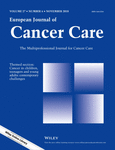Self-efficacy, cancer-related fatigue, and quality of life in patients with resected lung cancer
Funding information
This research was supported by Nantong City Social Development Project (HS2012025), Jiangsu Province Postdoctoral Research Foundation (1301072C), and China Postdoctoral Science Foundation (2103M541705).
Abstract
We aim to investigate the relationship between self-efficacy, cancer-related fatigue, and quality of life in patients with resected lung cancer. A prospective cohort among 452 patients with resected NSCLC was conducted in 2014 to 2015. The self-efficacy, cancer-related fatigue, and quality of life assessments were investigated in the 3-month follow-up by General Self-Efficacy Scale (GSES), Multidimensional Fatigue Symptom Inventory–Short Form (MFSI-SF), and Short Form Health Survey (SF-36), respectively. Structural equation modelling was used to evaluate the relationships between the latent variables. Structural equation modelling analysis showed that both GSES (β = 0.69, p < 0.05) and MFSI-SF (β = −0.46, p < 0.01) had direct effect on SF-36; GSES also can indirect effect on SF-36 though MFSI-SF (β = −0.42, p < 0.01). The model fit indices demonstrated a reasonable fit (χ2 = 27.221, CFI = 0.911, GFI = 0.962, RMSEA = 0.051). The results showed self-efficacy has direct and indirect effect on quality of life in patients with resected lung cancer. Furthermore, cancer-related fatigue, as mediated variables, can mediate the relationship between self-efficacy and quality of life. In the future, self-efficacy interventions are need for improving quality of life in patients with resected lung cancer.
CONFLICT OF INTEREST
The authors had no conflicts of interest to declare in relation to this article.




